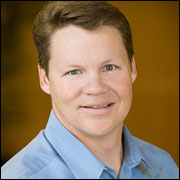
LiveOps is a cloud-based company that has two businesses. It began by providing call center outsourcing services through a network of more than 20,000 independent home-based agents, then began offering its contact center Platform as a Service.
Monster.com describes LiveOps as the nation’s largest domestic outsourced call center.
LiveOps call center agents run their own home-based businesses using a PC, an Internet connection and the phone, making their own schedules. The company claims it gets 33 percent more revenue per campaign than traditional call center outsourcers.
Increasingly, businesses are moving to the cloud to cut costs and spin up rapidly, but going to the cloud alone is no guarantee of success. CRM Buyer sat down with Jeremy King, executive vice president of technology at LiveOps, to learn how the company has leveraged the cloud to build its business.
CRM Buyer: Let’s look at your contact center platform. That’s based on the cloud. Do you have your own servers, or do you use someone else’s services — Amazon or RackSpace or some other collocation facility’s servers?
Jeremy King:
We host at a collocation facility but it’s all our own equipment. They do minor maintenance, but we come in and make changes and repairs and all the major stuff.
The key to our business is telephony connectivity — we use carrier hotels that have access to any carrier. We have every single major carrier on our platform. We probably have 10 different carriers.
Enterprise customers have relationships with carriers and want to maintain those relationships.
CRM: What’s a carrier hotel?
King:
Carrier hotels are collocation facilities or carrier facilities that work with carriers. They are used for switching from one location to another, and it’s best to have all the cabling from different carriers in one place.
We’re telephone-focused, so we’re very aware. We’re working with a company in Nevada and one in New York and they meet our needs.
CRM: Has anyone else picked up on this outsourced agent model in your industry?
King:
LiveOps was built on top of direct contact software. Most software’s built for a supervisor sitting up high and overlooking a sea of people.
CRM: Like a panopticon?
King:
Yes. In our case, we knew we’d never have a face to face interview with our agents. Everything’s virtual — training, workforce management, scheduling.
People log in and decide when they want to work so we have a totally different way of scheduling. This changes the way we do routing.
Most companies have skill-based routing — tech guys get tech calls, sales guys get the sales calls.
We’re different. If two agents are both Mac people and one turns out to answer questions in five minutes less than the other, the preference will be given to her, and that’s called “performance-based routing.” Performance-based routing can be built off any attribute because every customer has different things they think are important.
Not only are we cheaper because we use distributed home agents, but our performance-based method changes the ability to get calls to better-performing agents, so we’re able to make the performance curve change dramatically.
And with the distributed call model, we can answer calls at any time; we can handle almost any peak. Most call centers have massive peaks where they have problems. With insurance companies, for example, most of the calls come in on Mondays, so you have this massive spike on Mondays with huge hold times.
CRM: How does your outsourced call center work?
King:
Clients have an on-demand schedule. They publish how many seats they need and when, and agents log in and say which clients they want to work for, and during which times, but they need to have the certifications for working for those clients. For example, they need to be certified for a particular set of skills if they want to work for insurance companies.
CRM: How does this work for companies that want to use your contact center platform? Do they contract with you for up to Y servers during peak times and down to Z servers during off-peak hours?
King:
We work on a per-agent, per-month basis in the on-demand call center software area, but in the outsourced agent area we work on a per-minute basis. The incentive is to keep the agents busy as much as possible, and pay for what you eat.
CRM: What about your rates for the SaaS contract?
King:
We charge per-agent, per-month and clients can peak or down as much as they need. The ability for us to turn on and off is incredibly fast.
We have an amazingly tight integration with Salesforce.com, which uses our products, but we can also integrate with other CRM companies.
Time is really the key to integration; one of the other big things is access to integration capabilities. We use RESTful APIs (application programming interfaces), but we can also connect through SOAP. That makes a huge difference in the ability to get things up quickly.
Also, our tool is Web-based. Premise-based systems need [to be maintained or run by] IT people who need to understand the equipment and its capabilities. Our Web-based system is easy to use.
Our call Flow designing tool is incredibly powerful but also easy to use because it has a drag and drop interface.





















































